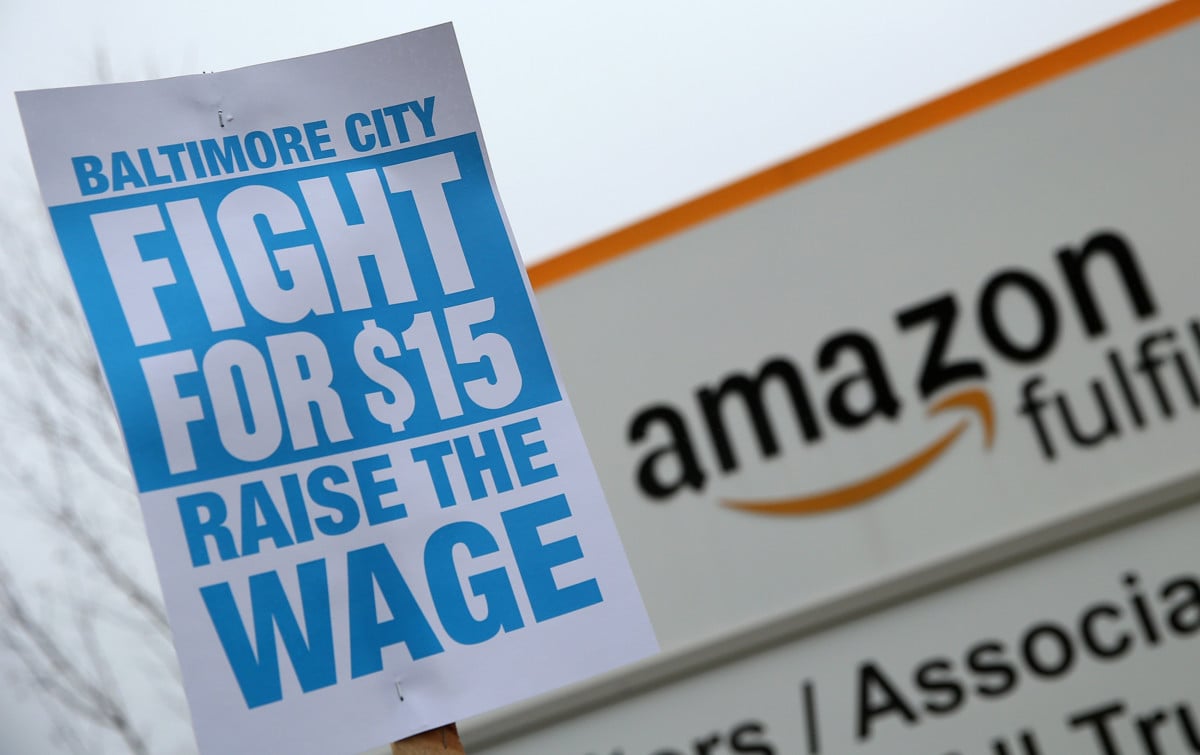Truthout is a vital news source and a living history of political struggle. If you think our work is valuable, support us with a donation of any size.
Last week Amazon announced that it would impose a $15 an hour minimum wage for its workforce, including those hired through staffing agencies. This was a huge victory for the labor and community activists in the Fight for $15 campaign, as well as for Senator Bernie Sanders and Representative Ro Khanna, who had recently proposed legislation that would have penalized huge companies like Amazon for paying low wages.
As the world’s second corporation (following Apple) to reach a market capitalization of $1 trillion, making CEO Jeff Bezos the world’s richest person, Amazon had become a symbol of inequality in the country and the world. Its warehouse workers put in long hours, doing highly regimented and grueling work, and often were paid little over the national minimum of $7.25 an hour.
This was the reason that Fight for $15, Sanders and Khanna made Amazon a central focus of their efforts. The decision by Bezos to agree to a $15 an hour minimum wage will not only benefit the hundreds of thousands of Amazon workers who will get pay raises, but it also places pressure on other large employers to similarly raise their wages. In fact, Bezos explicitly committed himself to work toward a national minimum wage of $15 an hour.
While this win shows the power of progressive organizing, there is another side to this issue that should not be overlooked. Bezos agreed to this increase in the context of the tightest labor market in almost two decades. At 3.7 percent, the unemployment rate is the lowest it’s been since 1969.
The tight labor market forced Amazon to raise wages to attract the workers it needed to staff its warehouses. In some places, it may have already been paying close to its new $15 an hour minimum. In this context, the decision to accept $15 as a nationwide floor was much less of a lift than it would have been if the unemployment rate was still over 5.0 or 6.0 percent.
This low unemployment rate is largely possible because of policy decisions by the Federal Reserve Board. Specifically, the Fed decided to hold off on interest rate hikes that would slow the economy and reduce the rate of job creation. This was not an accident. The Fed was responding to political pressure from the Fed Up coalition.
The Federal Reserve Board has historically been excessively responsive to the concerns of the financial industry. This is largely due to its structure, which gives the industry a direct voice in setting the country’s monetary policy. As a result, the Fed has often given excessive attention to controlling inflation, even at the cost of higher unemployment.
In 2014, a poll of the Fed’s Open Market Committee (FOMC), which determines monetary policy, found that the median estimate of the non-accelerating inflation rate of unemployment (NAIRU), the effective measure of full employment, was 5.4 percent. This meant that if the unemployment rate fell below 5.4 percent then inflation would start to spiral upward. As the unemployment rate began to approach this level, many members of the FOMC began to call for the Fed to raise interest rates to keep unemployment from falling lower.
This is where Fed Up played an incredible role. They were a crucial voice on the other side, constantly reminding the Fed of its legal mandate to promote full employment. Fed Up had important allies in this effort, most importantly former Fed chair Janet Yellen, but it is likely that Yellen and her allies on the FOMC would have been forced to raise rates sooner and faster if not for pressure from Fed Up.
This is a huge deal. Allowing the unemployment rate to fall to 3.7 percent rather than, say 5.4 percent, added more than 3 million jobs. Furthermore, the people who filled these jobs were disproportionately those who were most disadvantaged in the labor market, such as Black and Latino workers, workers with less education, and those with criminal records.
In addition to creating jobs for millions of workers, the tighter labor market has also hugely increased the bargaining power of those at the bottom of the wage ladder. Employers are actually having to compete for workers, even in historically low-paying industries. For example, the average hourly pay of restaurant workers rose 4.2 percent in the last year.
To be sure, workers still have a long way to go to make up the ground lost in the Great Recession, and even longer to make up for the three decades of stagnating wages that preceded it, but the low unemployment rate we are currently seeing makes a huge difference. We need many more successes like the victory at Amazon, but the prospects for such victories will be much better if we can keep the unemployment rate low, and ideally push it still lower.
Media that fights fascism
Truthout is funded almost entirely by readers — that’s why we can speak truth to power and cut against the mainstream narrative. But independent journalists at Truthout face mounting political repression under Trump.
We rely on your support to survive McCarthyist censorship. Please make a tax-deductible one-time or monthly donation.
